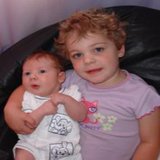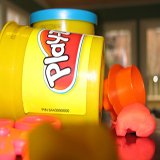Stimulating Baby Movements -
15 to 18 Months
Your child becomes increasingly adventurous as he is building self confidence in various baby movements during this 15 month old development to 18 month old development phase.
His natural curiosity, coupled with his new hand eye coordination skills, opens up a whole new range of play experiences and kid games to play for him.
|
He realizes that he can move around much more easily without needing to seek help and struts about the house building self confidence as he continues.
Suitable suggestions for Baby Movements
(15 Month Old - 18 Month Old)
Building Self Confidence
Toddlers have an amazing ability to improvise.
They go up and down stairs using a variety of different strategies, ranging from baby crawling on all fours to bottom-shuffling their way from stair to stair.
There is no right way to do this. Your toddler will use the technique that best suits him and his level of child development physical ability.
The best help you can give is plenty of encouragement, because his enthusiasm can quickly be dampened by repeated failure, perhaps because he cant coordinate his feet well enough or because every time he bends down he falls over.
When success eludes him, he may be tempted to give up trying completely.
Parent Involvement Activities
Your parent involvement activities can be extremely supportive, not just in giving your toddler verbal support but also in providing practical help.
Some parent involvement ideas:
- you could hold his hand when he attempts to do the "kids walking quickly" thing in this way you both know that there is no risk of him falling over. This will encourage him to try harder.
- you could also form your hands into a protective cage around your child without your hands actually touching him as he does his best to climb up a set of steps.
Your presence as parent gives him a feeling of safety as well as increasing his sense of delight in his achievements as he shares them with you.
This way he is continually building self confidence, motivated to repeat the experience.
Your intention should be to reduce this level of direct involvement in his movement around the home gradually over the next few months as his hand eye coordination and fundamental movement skills mature.
In the meantime, however, give him all the help he needs, without taking over completely.
Toddler Action Songs
He loves any game or activity involving baby movements and these let him get use to the sensations associated with changing posture and position.
Your baby squeals with delight when you and he recite action songs together and do the rhythmic movements in synchrony.
Try to learn a varied repertoire of these toddler action songs, for example, from other parents, books and videos.
Top Tips for Baby Movements
(15 Month Old - 18 Month Old)
- Reassure him when he falls.
- Demonstrate actions if necessary.
- Calm his anxiety.
- Don't do everything for him.
- Make him aware of safety.
The occasional tumble may upset him. All it takes to get him on his feet again is a cuddle from you, and reassurance that he is unlikely to fall again.
Your toddler learns by experience and he may need you to show him, for instance, how to sit in a large chair. He watches you closely and then tries to do the same himself.
He may become frustrated, for example when the pull-along toy doesn't go in the exact direction he wants. Don't let him give up. Instead, calm him and then encourage him to continue pulling the toy as he walks.
It's a lot easier and quicker when, for instance, you lift him into his chair. But he won't learn how to do this himself if that becomes your regular habit. He needs to try these maneuvers on his own.
Your toddler's new level of exploration skills potentially places him at higher risk. Remind him to take care and to watch what he does, but dont overdo the warnings or he may become unnecessarily fearful.
Top Toys for a 15 Month Old - 18 Month Old
- pull-along toy
- sit-and-ride toy
- child-sized table and chair
- inflatable soft balls
- paddling pool
Be sure to browse through all the baby brain development pages that is broken down in different age groups.
Find It!
Can't remember where you read something specific? Just type in your search term in the box below and your specific topic will be returned to you instantly.









